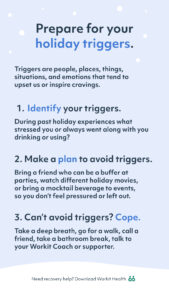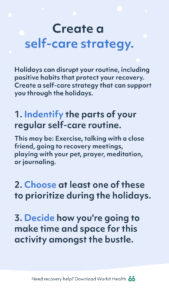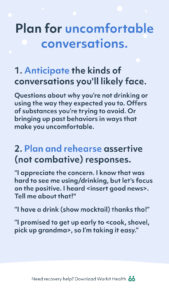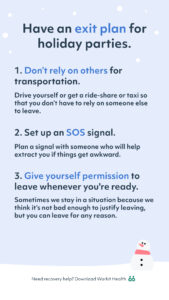The holidays can be intimidating when you’re in recovery from substance use disorders, but Workit Health has suggestions and tools to help you get through this season!
When I talk to people in early recovery from substance use disorder, I often hear some variation on the phrase, “How am I supposed to stay sober through Thanksgiving/ Christmas/ New Years?” This worry applies to all kinds of celebrations, from the Super Bowl to weddings, but it is especially prevalent leading up to the winter holiday season. Fortunately, you’re not alone. From our experiences—personal and professional—we at Workit Health have some suggestions for how to prepare for the holidays in recovery. Along with this post, we’ve also created a handy digital and printable list of suggestions and tools to help you get through this season.
Click here to skip to the download!
What are holiday celebrations usually like? Prepare for your specific triggers.
Triggers are people, places, things, situations, and emotions that tend to upset us or inspire cravings. The holidays can be rife with stressful interactions, complicated relationships, and anxious feelings that can make us want to escape via substances. And that’s not even getting into the “festive” consumption of alcohol and drugs that are common at a lot of parties and get-togethers.
So how can you navigate your triggers during the holidays? First, identify them. What are the things you’re likely to experience during this season that stress you or that, in the past, always went along with you drinking or using? Second, think about ways you can avoid those triggers. Maybe that means bringing a friend who can be a buffer at parties. Maybe it’s going to different stores or watching a different movie than usual. Maybe it means making sure you bring a delicious non-alcoholic beverage to events, so you don’t feel pressured or left out.
If you can’t avoid your triggers, you can cope with them. And the good news is, they usually don’t last long. Here are some ways to cope with addiction triggers when they occur:
- Take deep breaths
- Call a friend
- Go for a walk
- Take a bathroom break
- Take a hot shower/bath
- Look at pictures of people you love or cute animals
- Give yourself a treat that fits into your recovery plan
- Talk to a coach or counselor, 12-step sponsor, or other sober support person
- Watch/read/play something fun
- Do a Workit recovery course. (If you’re not a Workit member, you can still download the app and try out 12 courses for free.)
Create a self-care strategy.
Whether you’re traveling, having guests, or just dealing with all the busyness of the season, holidays can be a major disruption of your usual routine. This includes the positive habits and patterns you’ve been building to protect your recovery. That’s why it’s important to be mindful about creating a self-care strategy that can support you through the holidays.
Start by thinking through the ways you take care of yourself during your regular routine. This list might include (but is definitely not limited to):
- Exercise
- Talking with a close friend
- Going to meetings (recovery groups, 12-step, etc.)
- Playing or cuddling with a pet
- Time in prayer or meditation
- Journaling
Then pick a minimum of one of these behaviors that you’re going to prioritize throughout the holiday season. Think through when and how you will make time for it.
Look ahead to uncomfortable conversations and plan your responses.
You might be facing some tough conversations during these holidays. People might question you about why you’re not drinking or using the way they expected you to. They might offer substances you’re trying to avoid. They might bring up past behaviors in ways that make you uncomfortable.
Think about these possible conversations and plan how you’ll respond. The goal is to be assertive rather than passive or aggressive. For example:
- Expectation: My grandma is going to lecture me about how bad it was when I was still drinking/using.
Response: “I know that was hard for you to deal with and I appreciate your concern, but let’s focus on the positive. I heard <insert good news/interesting event>. Tell me about that!” - Expectation: People will offer me drinks/drugs:
Response: Depending on the situation and person, you can share that you’re in recovery now, or you can make up an excuse. If you don’t feel up to explaining your recovery, some popular excuses are:- “I have to drive later.”
- “I’m on antibiotics (supplements, other meds).”
- “I already have a drink (while brandishing non-alcoholic beverage of choice).”
- “I’m trying to be healthier.”
- “I have a headache and don’t want to add a hangover.”
- “I promised to get up early to shovel the driveway/help cook/other chore, so I’m taking it easy.”
- “Drinking/using has been making me feel sick lately, so I’m taking a break.”
Have an exit plan for holiday celebrations and events.
Just knowing that you can leave can make an event much less stressful. This is true even if you don’t need to actually take that exit, but is especially true if you do.
- Tell the host ahead of time that you might need to duck out early.
- Drive yourself or get a ride-share or taxi so that you don’t have to rely on someone else to leave.
- If you’re staying with family or friends who drink, use, or trigger you in other ways, consider having a backup plan of a hotel or other accommodation.
- Set up an SOS signal with someone who will help extract you if things get awkward. This can be an in-person signal to another person who is present, or could be a text or DM.
- Know where your coat or purse is so that you can easily grab them when you’re ready to go.
- Give yourself permission to leave early even if nothing goes wrong. Sometimes we stay in a situation because we think it’s not bad enough to justify leaving, but you can leave for any reason.
In early recovery, the holidays can be a lot of pressure. They may remind us of past conflicts or of unhealthy things we used to enjoy. But that’s not all they do! They also give us opportunities for mending damaged relationships and for creating new traditions. There are probably a lot of aspects of the holidays that you enjoy; focus on how you can optimize those while you’re planning ways to minimize your triggers and stress. You can celebrate this season without compromising your recovery. A little preparation will make it easier!
Downloadable tool
We used some of these tips to create useful graphics to help you through the holiday season with your recovery intact! You can click on each image below and download it to save to your phone, or click here to download a printable version to keep in your pocket or wallet.













